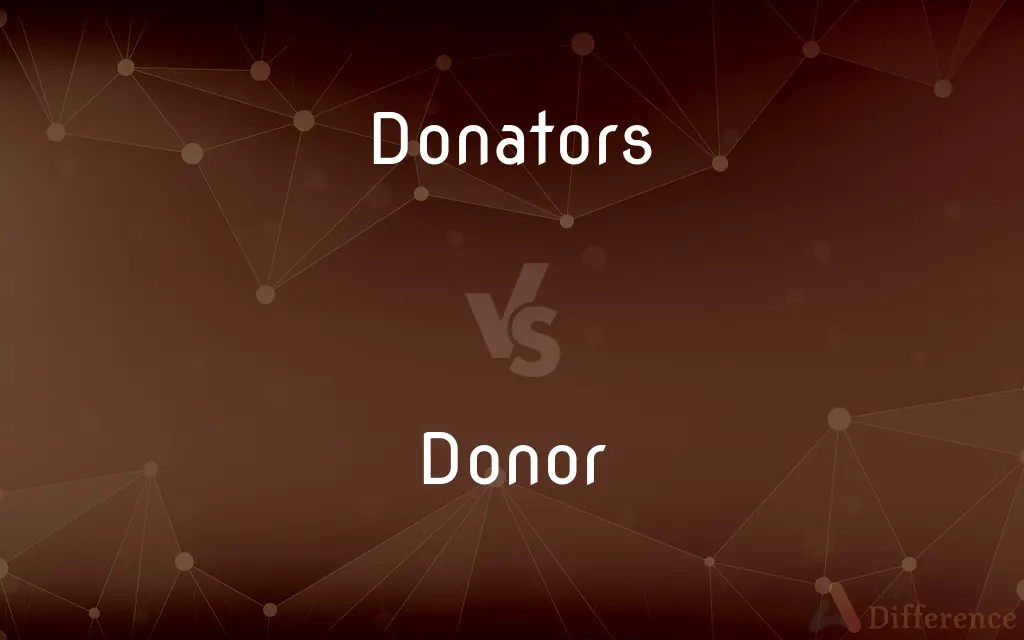Donators vs. Donor — What's the Difference?
By Maham Liaqat & Urooj Arif — Updated on April 22, 2024
Both refer to those who give, but 'donator' is less common and slightly more formal than 'donor'.

Difference Between Donators and Donor
Table of Contents
ADVERTISEMENT
Key Differences
Donators are individuals or entities that contribute resources like money or goods to causes or individuals, while donors often refer specifically to those who contribute to charitable organizations or causes. This distinction highlights the context in which each term is typically used, though both denote giving.
Donators might be used in formal or legal contexts to denote someone who has made a donation, whereas donors are frequently mentioned in medical contexts, such as blood or organ donors. This reflects the more general application of the term 'donor'.
In some languages and jurisdictions, donators can carry legal implications specific to the nature of the donation, whereas donor is universally recognized and used in both everyday and specialized discourse, such as in healthcare and philanthropy.
The term donators sometimes appears in historical or very formal documents, while donors is used more commonly in contemporary language, indicating a shift in preference over time.
Donators often implies a one-time or occasional contribution, while donors might suggest a longer-term, possibly recurring contribution to a particular cause or organization.
ADVERTISEMENT
While both terms are nouns derived from the verb "donate," their usage varies slightly with donators being less common in everyday English, and donor appearing more frequently across various forms of media and conversation.
Comparison Chart
Common Usage
Less common, formal
More common, versatile
Context
Formal, legal
Medical, philanthropic, general
Connotation
Often one-time
Can imply recurring donations
Frequency in Language
Historical, formal documents
Widely used in contemporary language
Specificity
General giving
Often specific to the type of donation (e.g., blood, organ)
Compare with Definitions
Donators
A person who donates.
The donators at the gala received a special mention for their generosity.
Donor
An entity that provides financial support to an initiative.
The foundation acted as a major donor for the relief efforts.
Donators
An entity that gives resources or funds.
Corporate donators played a crucial role in funding the research.
Donor
A person who contributes money to charity.
The donor list included many prominent community figures.
Donators
Someone who gives a gift legally.
The donators signed the deed in the presence of witnesses.
Donor
A contributor to a cause or organization.
As a donor, she felt deeply connected to the charity’s mission.
Donators
A contributor to a specific project.
Several donators contributed to the building of the new library.
Donor
An individual who gives organs.
The donor was honored at the hospital for his lifesaving contribution.
Donators
A participant in a charitable event who contributes.
Donators to the cause were thanked in the monthly newsletter.
Donor
Someone who gives something to help others.
Anonymous donors are often the most humble.
Donators
Plural of donator
Donor
A donor in general is a person, organization or government which donates something voluntarily. The term is usually used to represent a form of pure altruism, but is sometimes used when the payment for a service is recognized by all parties as representing less than the value of the donation and that the motivation is altruistic.
Donor
A person who donates something, especially money to charity
An anonymous donor has given £25
Loans from rich donor countries
Donor
One that contributes something, such as money, to a cause or fund.
Donor
(Chemistry) An atom, molecule, or ion that provides a part to combine with an acceptor, especially an atom that provides two electrons to form a bond with another atom.
Donor
(Electronics) An element introduced into a semiconductor with a negative valence greater than that of the pure semiconductor.
Donor
(Medicine) Used for transfusion, implantation, or transplant
A donor organ.
Donor
One who makes a donation.
The charity raised $2,000 from various donors.
The hospital is seeking an organ donor.
Donor
(chemistry) A group or molecule that donates either a radical, electrons or a moiety in a chemical reaction. Compare acceptor.
A carbonyl donor molecule
Donor
One who gives or bestows; one who confers anything gratuitously; a benefactor. Inverse of recipient.
Donor
One who grants an estate; in later use, one who confers a power; - the opposite of donee.
Touching, the parties unto deeds and charters, we are to consider as well the donors and granters as the donees or grantees.
Donor
Person who makes a gift of property
Common Curiosities
How are donators and donors different?
The term 'donator' is less commonly used and can be more formal, while 'donor' is widespread and applicable in various contexts including medical and philanthropic.
Can businesses be considered donators or donors?
Yes, businesses can act as either donators or donors, depending on the context of their contribution.
Are all donors also donators?
Yes, all donors can be considered donators as both terms involve the act of giving, although 'donor' is the more commonly used term.
How do organizations recognize donators and donors?
Organizations may recognize them through acknowledgments in publications, thank-you events, or physical tokens of appreciation.
What motivates a donator or donor to give?
Motivations can include altruism, tax benefits, social recognition, or personal connections to a cause.
What is a donor?
A donor is a person or organization that donates something, especially money or other resources, to a cause, charity, or individual.
What is a donator?
A donator is someone who gives something, especially money or goods, to help a person, group, or cause.
Can the term donor apply to non-monetary donations?
Yes, 'donor' can refer to contributions of organs, services, or goods, not just monetary donations.
How do tax laws affect donors?
In many countries, donors may receive tax deductions or credits for their donations, depending on local tax laws.
Is there a legal difference between a donator and a donor?
In general English usage, there is no significant legal difference, though 'donator' might appear in more formal or legal contexts.
Can someone be a one-time donor?
Yes, someone can be a one-time donor, often contributing to a specific cause or in response to an immediate need.
How do educational institutions benefit from donators or donors?
They benefit through financial support, scholarships, facility improvements, and program funding, enhancing educational opportunities.
What is the significance of anonymous donors?
Anonymous donors often wish to contribute without seeking personal recognition, focusing instead on the cause or the effect of their donation.
What impact do donators and donors have on society?
Both play crucial roles in supporting various societal needs, from healthcare to education and disaster relief.
Are there ethical considerations in donating?
Yes, ethical considerations include the transparency of how donations are used, respecting the wishes of the donor, and ensuring that donations do not exert undue influence.
Share Your Discovery

Previous Comparison
Ew vs. Yuck
Next Comparison
Autograph vs. SignatureAuthor Spotlight
Written by
Maham LiaqatCo-written by
Urooj ArifUrooj is a skilled content writer at Ask Difference, known for her exceptional ability to simplify complex topics into engaging and informative content. With a passion for research and a flair for clear, concise writing, she consistently delivers articles that resonate with our diverse audience.














































